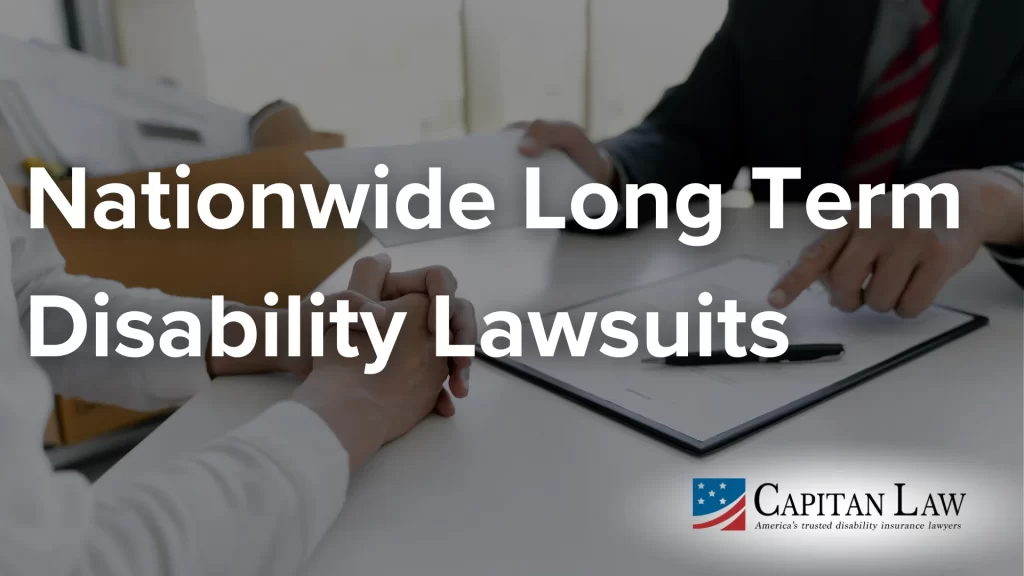 If your long term disability claim for benefits under a group policy was denied or terminated, or if your appeal to the claim administrator (most often an insurance company) was denied, what do you do now? Assuming you do not have any voluntary appeals remaining, and assuming you are not in a position to request that the insurance company reconsider its appeal determination, your only remaining legal option may be to file a lawsuit in a court of law. Lawsuits seeking to recover denied or terminated long term disability insurance benefits through a group insurance contract are most often governed by the federal law ERISA. Below are some highlights and more detailed general information about LTD lawsuits:
If your long term disability claim for benefits under a group policy was denied or terminated, or if your appeal to the claim administrator (most often an insurance company) was denied, what do you do now? Assuming you do not have any voluntary appeals remaining, and assuming you are not in a position to request that the insurance company reconsider its appeal determination, your only remaining legal option may be to file a lawsuit in a court of law. Lawsuits seeking to recover denied or terminated long term disability insurance benefits through a group insurance contract are most often governed by the federal law ERISA. Below are some highlights and more detailed general information about LTD lawsuits:
- Most group long term disability insurance contracts are governed by ERISA, which is a federal law subject to the review of federal courts.
- The disabled plaintiff usually must go through an appeal process directly with the insurance company before filing a lawsuit with limited exceptions.
- There are deadlines by which you must file a lawsuit that can depend on your insurance plan/policy or state. The most common damages to seek recovery of in a LTD lawsuit is payment of past-due and future monthly benefits, in addition to other forms of commonly requested relief.
- The case is most often decided by a Judge, not a jury. The possible outcomes of a long term disability lawsuit include settlement negotiated by the parties or a decision by the Judge granting or denying your requests for relief.
- It can take months or years to resolve a lawsuit once it is filed.
Table Of Contents
What is ERISA?
It is very likely that any dispute or rights you may have through your group long term disability insurance coverage is governed by federal law – specifically, the Employee Retirement Income Security Act of 1974, commonly referred to as ERISA (“er-ih-suh”). Since ERISA is a federal law, it is most often the case that the disabled plaintiff must file his or her lawsuit in federal court.
Exceptions: There are situations where ERISA may not apply or govern a disability insurance claim, such as where the disabled person obtained his or her disability coverage through a state, local, or municipal employer or church employer.
When can you file a lawsuit seeking the payment of long term disability insurance benefits?
When a dispute arises between a disabled claimant and the payor of those benefits, one level of administrative appeal is typically required before the disabled person can file a lawsuit in a court of law to challenge that denial or termination of benefits. In some instances, two levels of appeal may be required depending on the terms of your LTD plan or policy. If you have exhausted all mandatory appeals to the claim administrator or insurance company, you then likely have the option to file a lawsuit seeking payment of your long term disability insurance benefits. There are some limited exceptions to the general requirement that the disabled claimant must exhaust his or her mandatory appeal rights before filing a lawsuit, such as a situation in which the insurance company fails or refuses to render a timely decision on appeal, but we highly recommend consultation with a disability insurance attorney to weigh your administrative appeal and litigation rights before moving forward to court.
Quick Tip: It is highly recommended that you obtain legal representation during the appeal process with the claim administrator, long before you get to the point where your only remaining option is a lawsuit. It is more clear that you require the help of a long term disability insurance attorney once your only remaining option is to file a lawsuit, but your best interests will be served by hiring a LTD lawyer sooner rather than later.
Is there a deadline by which you must file a lawsuit to recover payment of long term disability benefits?
Yes, but the deadline can vary based on your specific insurance plan or policy and can also vary by state. Deadlines to file lawsuits are referred to in the legal community as statutes of limitation. Your cause of action must be filed a certain date, or else it could be rejected by the courts as untimely. The group long term disability insurance policy usually specifies the time by which you must file a lawsuit. These time limits vary from policy to policy. It is also important to consider when the lawsuit deadline clock starts ticking. While most claim administrators and insurance companies must now advise a claimant of the date by which he or she must file a lawsuit under ERISA due to more recent regulation changes, it is always best to obtain a full, complete copy of your disability insurance policy and to consult with an experienced disability insurance lawyer so that you can determine the date by which your cause of action should be filed in a court of law.
What can I seek to recover when I file a LTD lawsuit?
 The most common damages to seek when filing a lawsuit due to the wrongful denial or termination of group long term disability benefits is payment of past-due LTD benefits owed and reinstatement of monthly benefits moving forward. Disabled plaintiffs can also request that the court award payment of pre-judgment interest, costs associated with the lawsuit, and attorney fees. There are other forms of relief that can be requested, but these are the most common.
The most common damages to seek when filing a lawsuit due to the wrongful denial or termination of group long term disability benefits is payment of past-due LTD benefits owed and reinstatement of monthly benefits moving forward. Disabled plaintiffs can also request that the court award payment of pre-judgment interest, costs associated with the lawsuit, and attorney fees. There are other forms of relief that can be requested, but these are the most common.
Will the lawsuit be heard and decided by a jury?
No, it is not common for a jury to be used in a lawsuit seeking to recover group long term disability benefits under the federal law ERISA. It is most common for group long term disability claims to be decided by the Judge based on written motions by the parties to the lawsuit.
What are the possible outcomes when filing a long term disability lawsuit?
Generally speaking, there are a few types of outcomes that are possible when filing a long term disability lawsuit that can possibly include: (1) a settlement between you and the insurer of the disability insurance plan/policy or (2) a Judge granting or denying your requests for relief. These are the two general paths that litigation can take, both of which can be very complicated. You can learn more about long-term disability settlements here. With respect to potential decision from a Judge, those can include (1) a grant of all damages and relief that you requested, (2) a grant of some relief requested with denial of others, (3) “remand” (sending the claim back) to the claim administrator for further administrative proceedings or reviews, and/or (4) a denial of your causes of action by finding for the defendant(s).
How long does it take for a long term disability lawsuit to be resolved?
As with most things in life and in the law, how long a LTD suit can take to resolve depends on many factors. Some of those factors are the particular insurance company or defendant involved, the particular court the lawsuit is filed in, the Judge’s scheduling of your case, disputes over discovery, the availability of mediators, the strength and complexity of your particular cause of action, etc… It is possible for a lawsuit to resolve within months (for example, if a mutual settlement agreement can be reached by the parties) or a case can take years to reach a final resolution by the time everything is said and done.
Our Law Firm is Experienced in Long Term Disability Lawsuits, Our Legal Consultations Are Free
Capitan Law is experienced in representing disabled plaintiffs in lawsuits concerning the wrongful denial or termination of ERISA-governed long term disability benefit claims. We work on a contingent fee basis (no money upfront and no attorney fees paid unless we recover the benefits you are rightfully owed per the policy and by law). Please contact our law office to schedule a free legal consultation.